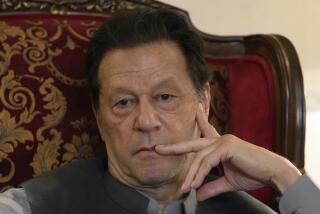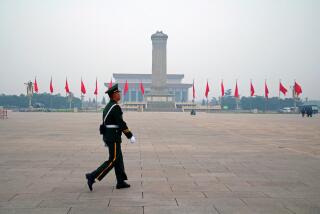China Executes Ex-Aide in Bribery, Secrets Case
- Share via
PEKING — In what is apparently the most serious case of its kind here, Chinese authorities Monday executed one former government official and sentenced another to 17 years in jail for taking bribes from foreign businessmen and “leaking important state secrets” to them.
The pair accepted more than $260,000 in bribes in exchange for giving inside information to foreign companies about the Chinese position in negotiations for the purchase of automobiles, according to the official New China News Agency. They were also said to have pressured a Chinese company to pay the asking prices for the foreign cars.
The defendant sentenced to prison is believed to be the daughter of Chinese revolutionary commander Ye Fei, 72, who served until 1982 as head of the Chinese navy. Ye is now a member of the Communist Party Central Committee and vice chairman of the National People’s Congress.
According to Chinese press and television accounts, the imprisoned official is Ye Zhifeng, 40, who was identified only as a woman working for the state economic commission. Earlier this year, Chinese sources said privately that Ye Fei’s daughter was under investigation for illegal financial transactions involving foreigners.
The executed former official was Zhang Changsheng, 31, who was described as an employee of the China Minority Nationality Economic & Cultural Development Corp.
The news agency said that as soon as the death sentence was announced at Peking’s Intermediate People’s Court, Zhang “was sent to the execution ground.” The usual method of execution in China is to shoot the condemned person in the back of the head.
It was the strongest action that the Chinese regime has yet taken in its ongoing campaign to crack down on high-level economic crime. So far as is known, until Monday the death penalty had been carried out only against a tiny number of local or provincial officials convicted of corruption charges. The children of two high-ranking Shanghai officials were executed in February after they were convicted of multiple rapes.
“We should draw a lesson from this,” said the Communist Party newspaper, the People’s Daily, in a commentary in its editions today. It said crimes such as the ones announced Monday “bring about direct and indirect economic and political losses and pose a great danger to the country.”
One Peking-based diplomat said he thought the charge of leaking state secrets was included in Monday’s case to help justify the imposition of the death penalty. “They threw in state secrets so that no one can say this is not really a serious crime,” this observer said.
Zhang and Ye were said to have been convicted March 27 after a closed trial. According to Chinese press accounts, they then appealed, but their convictions were upheld 11 days later by the Higher People’s Court of Peking.
The court verdict said that between November, 1984 and April, 1985, Ye, who worked in the economic commission’s import and export bureau, “took advantage of her position to reveal time and again important state secrets” about Chinese plans to buy cars. The information was given to unidentified “foreign and Hong Kong businessmen” through Zhang.
Chinese authorities said Zhang took cash bribes from the foreign businessmen, mostly in Hong Kong currency, totaling nearly $257,000 at current exchange rates. They said he also received two video sets and a camera.
More to Read
Sign up for Essential California
The most important California stories and recommendations in your inbox every morning.
You may occasionally receive promotional content from the Los Angeles Times.










